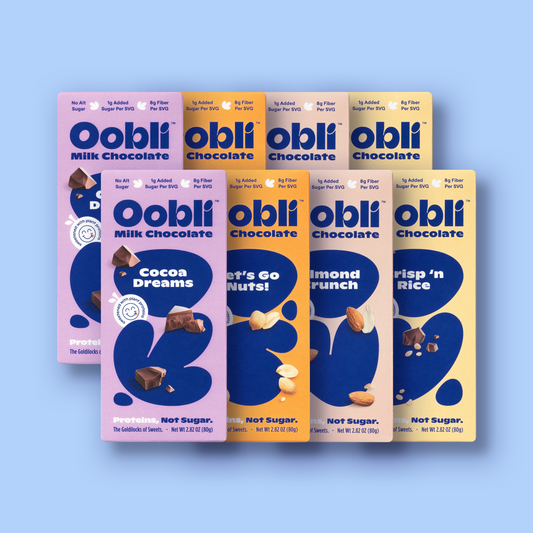Sweetness without the sugar rush? Sounds like a dream come true! Artificial and even natural alternative sweeteners, those sneaky little sugar substitutes, have found their way into our lives. But while they may seem like a sweet escape from sugar's clutches, artificial sweeteners bring their own problems.
One of the issues with sweeteners is that some of us can’t digest them properly. Today, we’re going to talk about intolerance to artificial and alternative sweetener symptoms. You might not even know you have an intolerance for sweeteners, but we’ll help you understand the signs and symptoms, and offer up an exciting new alternative to help you leave sweeteners in the rear-view.
The Rise of Alternative and Artificial Sweeteners: A Bitter-Sweet Revolution
Artificial sweeteners have stealthily taken over the world, inserting themselves into just about every food product you can imagine. Before we dive into the intolerance to artificial sweeteners symptoms, let’s take a look at the rise of artificial sweeteners and how they’ve infiltrated our pantries.
What are Artificial Sweeteners and Alternative Sweeteners, and Why Are They in Everything?
Artificial sweeteners are sugar substitutes that give us the sweetness we crave without the extra calories. They've wormed their way into our food and beverages like undercover agents, hiding in everything from sodas to yogurts and even chewing gum.
But why are they everywhere, you ask? Well, it all comes down to our never-ending quest for guilt-free indulgence. People wanted to enjoy their favorite treats without worrying about their waistlines, and voila! Artificial sweeteners and even natural alternative sweeteners stepped in to save the day (or so we thought).
Most Common Artificial and Alternative Sweeteners: Stevia, Aspartame, Sucralose, and More
Let's meet the most common artificial and alternative sweeteners that have snuck into our lives. First up, we have stevia, a sweet leafy herb that packs a punch of sweetness without the calories. Stevia is a natural alternative sweetener extracted from the Stevia rebaudiana plant, but by the time it’s processed, there’s not a lot that’s natural about the stevia that’s added to our food and drinks.
Aspartame is an artificial sweetener that’s low in calories and high in sweetness. In fact, it’s around 200 times sweeter than sugar. Aspartame is used in a lot of sugar-free foods and drinks because it has no distinct flavor, other than being sweet.
Finally, we have sucralose. It’s what Splenda, the hugely popular sugar alternative for your cup of joe, is made from. Sucralose is a chemically-modified form of sugar that isn’t metabolized by the body, making it essentially calorie-free. You can learn more about aspartame vs sucralose in our handy guide.
The Appeal of Artificial and Alternative Sweeteners (and the Nasty Truth)
Artificial sweeteners and even natural sweeteners seem like the perfect solution to satisfy our sweet cravings while keeping our calorie count in check. We're drawn to their sweet promises of weight management, diabetes control, and cavity prevention. Who wouldn't want all that? But here's the nasty truth:
These sweeteners may come with a bitter aftertaste. Some studies suggest they could mess with our gut health, leaving us with bloating, gas, and digestive discomfort. And if that wasn't enough, there are whispers that they might even trick our brains into craving more sweets, leading us down a never-ending sugar substitute spiral.
So while artificial and other alternative sweeteners may seem like the heroes of the sweet world, it's important to keep an eye out for the potential downsides. The bitter truth might just be lurking beneath that sweet surface.
Intolerance to Alternative and Artificial Sweeteners Symptoms: Signs You May Need to Avoid Them in Your Diet
So, what are the intolerance to artificial sweeteners symptoms, and how do you know if you should be avoiding them? Let’s take a look at the most common intolerance or allergy to artificial sweeteners symptoms.
Digestive Problems: Irritable Bowel Syndrome, Bloating, and More
If you find yourself dealing with digestive woes like irritable bowel syndrome (IBS), bloating, gas, or even diarrhea after consuming artificial sweeteners, it's time to take notice. These additives can wreak havoc on your gut, causing pain and discomfort. So, if you notice these symptoms after a diet soda or low-calorie snack, it might be a sign to bid farewell to alternative sweeteners.
Neurological Symptoms: Headaches, Migraines, and Dizziness
Are you experiencing irritating headaches, pounding migraines, or a spinning sensation in your head after indulging in artificial sweeteners? Some people are more sensitive to these sugar substitutes, and their nervous systems react with unwelcome symptoms.
Research suggests that artificial sweeteners can cause headaches in certain people, and those suffering from migraines are more likely to experience a headache after consuming artificial/alternative sweeteners.
Mood Disorders: Anxiety, Depression, and Irritability
Believe it or not, artificial sweeteners can even impact your mental health. Studies suggest a possible link between these sweet additives, particularly aspartame, and mood disorders such as anxiety, depression, and irritability. If you find yourself riding an emotional rollercoaster after that innocent-looking sugar-free treat, it might be time to reconsider your relationship with artificial sweeteners.
Other Symptoms: Allergies, Weight Gain, and Increased Sugar Cravings
Artificial sweeteners and natural sweeteners like stevia can sometimes unleash a range of other unexpected symptoms. You might experience allergy to artificial sweeteners symptoms like itching, hives, or difficulty breathing after consuming these sugar substitutes.
While artificial sweeteners claim to be low in calories, they might still contribute to weight gain in some people. And here's a tricky one: consuming artificial sweeteners can increase your cravings for sugar. So, if these symptoms hit home, it's worth rethinking your relationship with artificial sweeteners and other alternative sweeteners.
What If I Discover I’m Intolerant to Artificial/Alternative Sweeteners?
So, you've been paying attention to the signs, and it seems like those artificial sweeteners are causing more harm than good in your life. Don't fret! Discovering that you're intolerant to these sneaky sweet substitutes might just be the beginning of a healthier and happier journey. Here's what you can do:
- Eliminate artificial and other alternative sweeteners like stevia from your diet
- Read labels and be mindful
- Focus on whole foods and natural alternatives
- Listen to your body and consider keeping a food diary
- Talk to a doctor or nutritionist about your intolerance to artificial sweeteners symptoms
Discovering an intolerance to sweeteners is an opportunity to prioritize your well-being and explore new, healthier alternatives. And we’re about to introduce you to a seriously sweet solution!
A Safe and Delicious Alternative: The World of Sweet Proteins
What if we told you there was a way you could enjoy sweetness without relying on artificial sweeteners? Well you can, and it might come from an unexpected source: sweet proteins! Welcome to the future of sweetness without sacrifice.
What are Sweet Proteins?
Sweet proteins are natural compounds that possess a delightful sweetness all on their own. These magical molecules can be found in various sources such as fruits like the West African Oubli fruit, berries, and even certain plants. With around 5,000 times the sweetness of sugar, sweet proteins are an excellent alternative for those seeking a healthier option.
The fascinating thing about sweet proteins is that they offer a unique and pleasant taste, without any of the bitter aftertaste that often comes with artificial sweeteners. Plus, they don’t contain any calories, impact your blood sugar levels, or carry the risks of intolerance to other artificial and natural alternative sweetener symptoms.
Health Benefits of Sweet Proteins
Not only do sweet proteins tantalize our taste buds, but they also come with a range of health benefits. Unlike their artificial counterparts, sweet proteins often offer a more wholesome package. The benefits of sweet protein are that they can provide natural antioxidants, vitamins, and minerals that contribute to overall well-being.
Some sweet proteins even possess potential medicinal properties, like aiding in digestion or supporting a healthy immune system. So, by opting for sweet proteins, you're not just satisfying your sweet tooth; you're also nourishing your body with goodness.
How Sweet Proteins are Different from Artificial Sweeteners and other Sugar Alternatives
Can sweet proteins be used as a sugar substitute? Absolutely! So how are they different from artificial sweeteners? To start with, sweet proteins are naturally occurring and derived from plants. On the other hand, many sweeteners are artificial — synthetic compounds created in a laboratory setting.
Importantly, all other alternative sweeteners on the market are biologically "small molecule," meaning they can have an affect on our gut microbiome composition and even on our blood sugar and insulin response. Sweet plant proteins on the other hand, are "large molecule," just like any other dietary protein. When you remove water and fat, our entire bodies are built on proteins. We're hyper efficient at digesting and metabolizing proteins, which don't come with the downsides of other small-molecule sweeteners.
Also, sweet proteins generally have a cleaner taste profile without the bitter aftertaste that some artificial sweeteners may leave behind. This makes sweet proteins a more enjoyable and satisfying alternative if you’re seeking sweetness without the drawbacks.
Experience the Magic of Sweet Proteins with Oobli
Here at Oobli, we’re on a mission to introduce the world to sweet proteins, because they’re so much better for us than artificial sweeteners! With a better taste than artificial and other alternative sweeteners, an antioxidant boost, and a much lower environmental impact than sugar production, we think there’s a lot to love about our sweet proteins!
Our Mission and Dedication to Health and Flavor
By now, you might be wondering how are sweet proteins made. We won’t bore you with the details, but we’ve worked incredibly hard behind the scenes to develop a revolutionary, precision fermentation process. This lets us ferment sugars into seriously sweet proteins, which can then be added to delicious sweet treats, foods, and drinks.
If you’ve experienced intolerance to artificial and alternative sweeteners symptoms, our sweet proteins are the answer you’ve been waiting for! We’re committed to producing sweet proteins that taste incredible and are not only safe for your health, but even bring some important benefits with them!
Oobli Products: A Tour of Our Delightful Selection
Once we perfected our fermentation process for sweet proteins, the next step was to put them to use and run a taste test. We’re proud to say they’ve passed with flying colors! You can try them for yourself - our Oobli sweet iced tea is available in a range of delicious flavors, contains just 7 grams of sugar per 16 oz can, and is made from real ingredients you can pronounce!
Or, why not satisfy your sweet tooth with our Oobli dark chocolate? It’s vegan, keto-friendly, and low sugar, but you wouldn’t know it from the taste! Explore our range of sweet tea and dark chocolate, you’re bound to find a tasty treat you can’t get enough of.
Final Thoughts on Intolerance to Alternative and Artificial Sweetener Symptoms
As you can see, intolerance or allergy to artificial sweeteners symptoms isn’t something to be taken lightly. From digestive problems and neurological symptoms to mood disorders and other unwelcome surprises, artificial sweeteners can disrupt our well-being in unexpected ways.
Luckily, you don’t have to give up your sweet tooth entirely to avoid the downsides of artificial sweeteners. Instead, start exploring the incredible world of sweet proteins! You’ll be amazed at how much better our Oobli treats taste, and even more blown away by the health benefits.
Find your new favorite guilt-free treat at Oobli - you’ll never look back!




